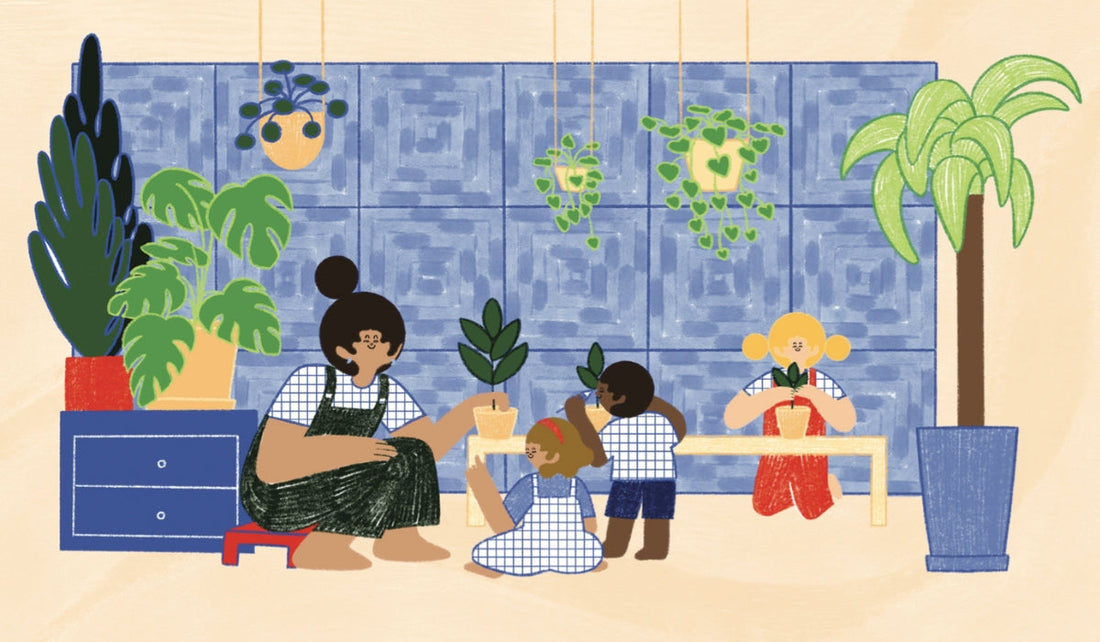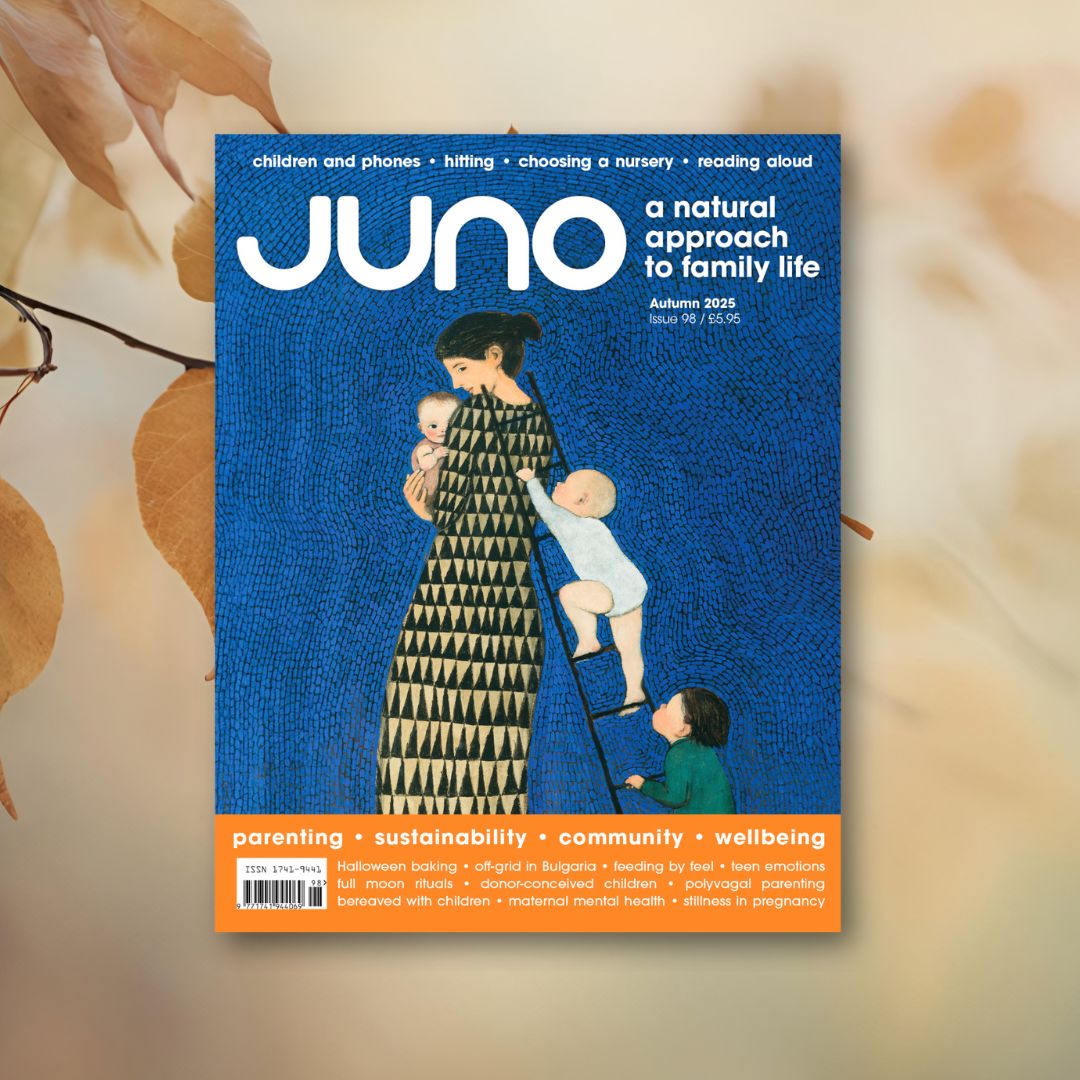In the first of a four-part series on Aware Parenting, Rebecca Sheikh introduces the attachment-based, trauma-informed approach
I discovered Aware Parenting when my first child was 9 months old, at a time when I felt confused, exhausted and completely disconnected from my own intuition and inner knowing. Despite having a successful career as a teacher prior to my daughter being born, I carried a deep well of grief, uncertainty, and unresolved stress and trauma. Shaun Tan’s book The Lost Thing is symbolic of how life felt for me up to that point. It’s no surprise that when my first child arrived, I found the experience of caring for a newborn to be emotionally overwhelming and lonely.
I barely slept for the first 6 months as my daughter seemed always to be crying. I would try everything to stop the crying: bouncing her, rocking her, walking, carrying, shushing, driving her around in a car, even using the hair dryer to zone out from the sound. Fortunately, on a trip to South Africa to visit my mum, a family friend lent me a copy of Aletha Solter’s book The Aware Baby. Finally, something that made sense to me! It was like a warm embrace; someone to hold my hand and share wisdom that felt safe and containing, based on a sound understanding of child development and research and science.
I felt a huge sense of relief to learn that the crying didn’t need to be stopped but was in fact a natural healing mechanism. According to Aletha Solter, it is likely that crying and raging following emotional stress or trauma evolved as an adaptive mechanism to help reduce the negative side effects of the physiological stress response. I discovered there were two reasons for the crying. Firstly, crying can indicate an unmet need. Secondly, not so well known, is that babies and children often have an accumulation of stress – or perhaps even trauma if there has been a traumatic birth or difficult pregnancy, parental stress, family stress or simply a more sensitive temperament to heal from – and if we allow them to express this through crying, raging or laughter, and lovingly hold space for these often big emotional releases, their nervous systems will naturally come back into balance again. As Pam Leo, the author of Connection Parenting, explains, “The crying is the healing not the hurting.” Sounds easy! But it’s been a 10-year journey in learning how to truly embody this understanding, while working through all my own unhealed stress and trauma, often triggered by my children’s behaviour.
I went on to discover that Aletha Solter is the founder of the Aware Parenting Institute and Aware Parenting philosophy. She is a Swiss American developmental psychologist who is well regarded as an expert on attachment, trauma and non-punitive discipline. Aletha studied with Jean Piaget at the University of Geneva and obtained a master’s degree in human biology. She went on to earn a PhD in psychology from the University of California, Santa Barbara. When her first child was born, there were no parenting books that supported attachment-style parenting and non-punitive discipline, while also considering the impact of stress and trauma on children’s development. The Aware Baby was the first book Aletha wrote (first published in 1984 and revised and updated in 2001). She went on to write five more books: Cooperative and Connected, Tears and Tantrums, Raising Drug-free Kids, Attachment Play, and Healing Your Traumatized Child.
Aletha Solter’s work resonated with me on such a deep level. It naturally followed on from the master’s I had just completed in Counselling in Education from the Tavistock and Portman, where I had begun to learn all about attachment theory and unconscious dynamics in relationships. I dived into reading all her books, becoming a Level 1 and then Level 2 Aware Parenting Instructor, and I am now Regional Coordinator for the UK, Ireland and sub-Saharan Africa.
Aware Parenting is based on four basic assumptions, which I have taken from Aletha Solter’s website, awareparenting.com. The first assumption is, “Children know what they need for optimal physical, emotional, and intellectual development.” This can be difficult to trust when we have not been trusted in this way, when we have become disconnected from our own feelings and intuition, and when our current systems and societal expectations are opposed to this belief.
The second assumption is, “If children’s needs are met, and if they are not hurt or stressed, they will be cooperative, compassionate, and nonviolent.” We need to be aware of our children’s needs and do our best to avoid possible sources of stress or trauma. This can be challenging when our own parents were not attuned to us or when we have been impacted by our own childhood. It requires us to seek support for our unhealed trauma as part of our parenting journey.
The third assumption is, “Children are extremely vulnerable. Stress, trauma, or unmet needs can have long-lasting, negative effects on their behaviour.” This means we take out a magnifying glass of curiosity to look beneath any behaviour to figure out what stress or trauma or unmet needs could be causing aggressive, whiny, annoying or otherwise undesirable behaviour.
The fourth and final assumption is, “Children can recover from the effects of stress and trauma, and they are born knowing how to do so.” I love the hope and empowerment this brings to us. It is through a deeper understanding of the healing effects of tears, tantrums, play and laughter that we can facilitate this process.
Through the three aspects of Aware Parenting, Aletha Solter provides a framework for supporting the above assumptions (taken from the Aware Parenting Institute website, awareparenting.com):
1. Attachment-style parenting
- Natural childbirth and early bonding
- Plenty of physical contact
- Prolonged breastfeeding
- Prompt responsiveness to crying
- Sensitive attunement
2. Non-punitive discipline
- No punishments of any kind (including spanking, ‘time-out’, and artificial ‘consequences’)
- No rewards or bribes
- A search for underlying needs and feelings
- Anger management for parents
- Peaceful conflict-resolution (family meetings, mediation, etc)
3. Healing from stress and trauma
- Recognition of stress and trauma (including unmet needs) as primary causes of behavioural and emotional problems
- Emphasis on prevention of stress and trauma
- Recognition of the healing effects of play, laughter, and crying in the context of a loving parent-child relationship
- Respectful, empathic listening and acceptance of children’s emotions
Each aspect is a powerful journey into connection and deeper relationship as we raise compassionate, co-operative, self-motivated, nonviolent and resourceful children. This is ultimately grounded in our capacity, self-care and healing any imprints that prevent us from truly enjoying being a parent amid its intensity. I’d encourage you to write out the affirmation below, shout it from the rooftops and whisper it into your heart:
I am a wonderful caring parent. I have always done the very best that I could do (given the information and resources available to me). I deserve neither blame nor reproach from anyone, including myself. My child(ren) is(are) lucky to have me as a companion and guide on their path towards adulthood.
From Helping Young Children Flourish Workbook by Aletha Solter (1993)
Finally, I urge you to find your village of others travelling this path in a wholehearted, connected way.
____
Rebecca Sheikh is a mother to two children, aged 11 and 8. She is an Aware Parenting Level 2 instructor and the regional coordinator for the UK, Ireland, and sub-Saharan Africa. She is also an Inner Child Journey practitioner, sandplay therapist and therapeutic play practitioner. She supports parents and organisations to help the children in their care flourish through introspection, self-nurturing and deep awareness. Rebecca is part of a collaboration called Pathways to Flourish, which delivers parenting programmes and Aware Leading courses in schools. flourishingchildhood.com and on Facebook and Instagram @flourishingchildhood
Illustrations by Louise Coutinho louisecoutinho.com
____
Further Reading
- The Aware Baby (revised edition) by Aletha J. Solter, Shining Star Press (2001).
- Cooperative and Connected: Helping Children Flourish without Punishments or Rewards by Aletha J. Solter, Shining Star Press (2018).
- Tears and Tantrums: What to Do When Babies and Children Cry by Aletha J. Solter, Shining Star Press (1998).
- Raising Drug-Free Kids: 100 Tips for Parents by Aletha J. Solter, Da Capo Lifelong Books, (2006).
- Attachment Play: How to Solve Children's Behavior Problems with Play, Laughter, and Connection by Aletha J. Solter, Shining Star Press (2013).
- Healing Your Traumatized Child: A Parent's Guide to Children’s Natural Recovery Processes by Aletha J. Solter, Shining Star Press (2022).
-
Connection Parenting: Parenting Through Connection Instead of Coercion, Through Love Instead of Fear by Pam Leo, WyattMacKenzie Publishing (2005).
____
Published in issue 91. Accurate at the time this issue went to print.







